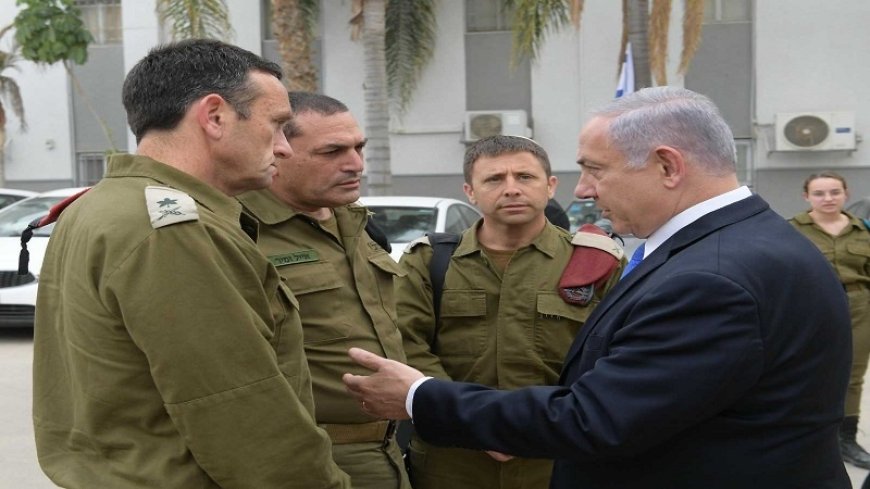The tremors of Al Aqsa Storm in Israel
Divisions and conflicts are increasing in occupied Palestine since the formation of Netanyahu's hard-line government and spreading to ordinary citizens; while the supporters of the two secular and religious groups have faced each other several times so far and sometimes concentrated in fighting and causing violence.

This division has also now spread to the army; where the support of the army to those who oppose what is known as the reform bill of the courts within the Zionist regime and at the same time the support of the Ministry of Finance and Internal Security to the Cabinet of Netanyahu to the armed militias provided by the empire and parties the right wing against the army of the Zionist regime, has raised tension and error between the government of Benjamin Netanyahu and the army where the two sides have been attacking each other with words from time to time.
In such an environment, the implementation of the surprise operation of "Al-Aqsa Cyclone" although it has pushed to the edge for several days the errors and tensions witnessed within the Zionist administration due to the shock caused to the administration, but the failure of the Netanyahu government to deal with the operation by on the one hand, and ignoring the issue of the fate of the Israeli captives contrary to the procedures of the past are new issues that have caused serious problems within the Zionist administration as well as other issues related to land operations. Al-Aqsa Hurricane Yediot Aharanot newspaper has written that three ministers of the Zionist government want to resign to force Netanyahu to accept responsibility following the failure in front of the Al-Aqsa Hurricane operation, and 75 percent of the Zionists hold Netanyahu responsible for failing to protect the settlements of the settlers. of the Gaza Strip. At the same time, more than half of the voters want the ruling Likud party to also resign Netanyahu after the current war in Gaza.
In addition, in the demonstration of thousands of people last Saturday in Tel Aviv, many Zionists who flocked to the streets against the Netanyahu government and its performance in response to the Al Aqsa Hurricane operation raised a banner telling the Hamas movement that they are ready to hand over to Netanyahu the approach to the release of children they. Nadaf Eyal, a Zionist analyst and journalist of the Yediot Aharanot newspaper, says: Benjamin Netanyahu, the Prime Minister of the Zionist regime, is still asleep and his cabinet is being run without a clear and understandable strategy. Haim Bibas, a representative in the Israeli parliament (Knesset) who is also the head of local government of the administration has announced that Netanyahu's cabinet has not yet woken up and has failed to control the situation in this emergency period. At the same time, the resignation several days ago of Galit Distel-Atbaryan, the Minister of Information of the Zionist administration and also the Minister of Health of that administration, is a sign of the aforementioned errors that continue to emerge within the fake government of Prime Minister Benjamin Netanyahu, however, all those errors do not end in those changes.
The errors have led people like Yair Lapid, the current head of the opposition, to also refuse to join the emergency cabinet. The council was recently formed involving Benny Gantz and several other people like Gadi Eisenkot, where however people like Itamar Ben Gvir the current Minister of Internal Security of the Zionist regime were kept aside. Ben Gvir, the leader of the right-wing and radical Zionist party (Religious Zionism) is among the individuals with the positions of canceling fees in the coalition of the Netanyahu government, which has gradually become one of the main challenges of the government. that. Itamar Ben Gvir An opinion poll conducted in Israel shows that the Likud party led by Netanyahu has experienced the largest decrease in seats in the parliament in recent weeks, where the seats have decreased from 28 seats to 18 seats in the elections on October 6, 2023.
one before starting the war. Undoubtedly, the differences do not end only in political parties and groups but are also widespread among the residents of the occupied areas. Opinion polls show that 80 percent of the residents of occupied lands believe that Netanyahu is the main culprit in the ongoing war; and 70 percent of Likud voters also point the finger of blame at Netanyahu. This is in a situation where a few days ago a large demonstration was held in front of the Ministry of Defense of the Zionist regime where the demonstrators were shouting slogans demanding Netanyahu's resignation. On the other hand, following several postponements of the regime's ground attack plan in the Gaza Strip, a crisis of "mistrust" has emerged within the cabinet between the Prime Minister and the army commanders.













































